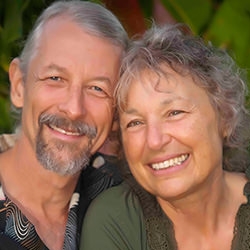

Search Results: practices
-
Trainer Tip: Practicing NVC in situations that are not emotionally charged can give you valuable practice to help you maintain a compassionate consciousness when circumstances are charged. It can help you stay in that consciousness for a longer period of time. You can also practice by naming the needs that you got met in the situations you enjoy.
-
For this practice assume that reactivity is arising any time you are distracted and not enjoying something. Practice throughout the day by focusing your attention for a few moments on something specific that you find pleasing. Notice the sensation of joy or pleasure in your body, and hold attention there longer than usual. This interrupts tension and contraction. Keep remembering to do this. When you go too long without directing your attention in this way, the practice becomes less accessible.
-
This 4 session telecourse recording offers practices while exploring the relationship between the core elements of NVC and universal spiritual principles.
-
When your dedication to something is fueled by a profound intention to benefit all life, you may call it your spiritual practice. This means cultivating compassion, wisdom, and skills to notice what truly serves life. Its a discovery and experiment in what does and doesn't serve life, and what you can do now - its not about what you believe or not. Continuously inquire: "What most deeply serves life and how can I do that right now?"
-
Anger is neither good nor bad. When you don't foresee it or you haven't cultivated a relationship to anger, you may behave from it and hurt yourself and others. There are three reasons anger may rise: primitive anger, resistance, and lack of resources. For practicing with these last two types of anger, we'll look at four practices: cultivate awareness, pause and expand, self-care and planning, and allow grief.
-
Join certified CNVC trainers Jim and Jori Manske to explore the relationship between gratitude and Nonviolent Communication as a way to learn and practice NVC.
-
With these practices make space before reacting to emotion or external stimulus. This can enable your capacity to respond from your self-connection to universally shared values. With practice you can create the capacity to temporarily put impulsiveness aside, in the service of connection with yourself and others, and in service of more informed and effective strategies.
-
A structured and clear contemplative practice can start with calming the body, heart, and mind for 20 minutes. Next, it contains at least three key elements: body awareness, clarifying what you already know, and consistent sustained attention. Celebrate and note insights, or any expanded perspective that pops into your awareness. Set an intention to notice these things in daily life and to practice further.
-
If you’re interested in improving your relationships, advancing in your career, or enhancing your capacity for change in life in general, communication is a powerful lever. Presence, listening, bringing curiosity and care, focusing on what matters, and pausing with silence, are all key. Read on for five foundational and advanced core practices you can start using today to improve your communication.
-
Practice making requests for feedback, clarity, and action. Opportunities for making requests might be when you expected something different from what you got, were treated undesirably, and noticed inner constriction or reactivity. Identify observations, feelings, and values to support finding the request. Ensure your request states what you want, is specific, names the present-tense action, and that you're open to feedback.
-
Exploring ways to stay compassionate and connected when someone seems angry or controlling.
-
Ask the Trainer: “I would like some suggestions on how to interact with a member of the practice group I started. This individual speaks and acts in a manner I interpret as angry and controlling.”
-
Create your own new personal practice using the Pathways to Liberation: Matrix of Self-Assessment and increase your capacity to access skills when you need them the most.
-
In moments where we would like to see change, personal growth or spiritual transformation, rather than immediately acting to make a change, Robert suggests we practice unconditional self-acceptance through a spacious presence to our inner experience. Robert asks us to give our attention and spacious awareness to our own judgments, inner contractions, and other experiences we often regard as undesirable.
-
I’m Jeff Brown, Executive Director of the Center for Nonviolent Communication. Mary asked me to be a guest writer for this newsletter, and it’s allowed me to look deeply at the role NVC plays in my life, personally and professionally— especially in running a successful NVC organization.
As the director of an NGO, I am grateful to have learned Nonviolent Communication. I utilize the principles constantly, and I’m not sure how I would survive without them.
-
By focusing on NVC process and practice without factoring in the interdependent, systemic dimension we unwittingly diminish the power of NVC. We reinforce the dominant paradigm, rather than challenging it -- making NVC one more tool for compliance. NVC principles can turn against its own purpose in cruel ways. NVC could also empower social change. We'll need our attention on this matter if we are to contribute to transforming the oppression we face and our collective march towards extinction.
-
This article explores ways of starting and maintaining NVC study groups and practice groups. It offers recommended reading support materials and poses questions to consider for structuring and organizing the group.
-
Workplace relationships are complex. Each employee brings their unique self to work. Their background, perspective, emotional triggers, and working style. Add to this the dynamics of power relations, and the fact that often workplace communication now takes place at our computer keyboards rather than face-to-face. Sylvia Haskvitz offers practical tips to make today's complex workplace relationships more satisfying and effective.
-
-

Quick Links
Subscription Preferences
Stay In Touch!
Looking for ways to keep up with NVC Academy news, get special offers, free resources, or words of inspiration? Here are five ways to stay engaged:


















